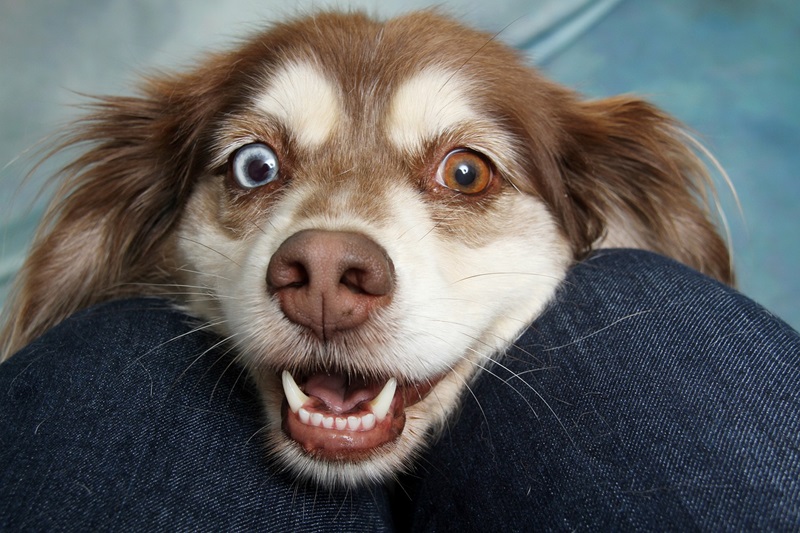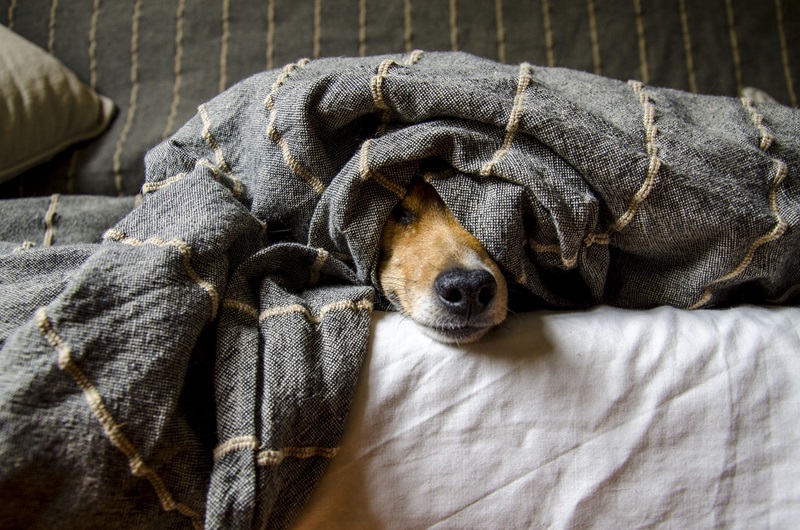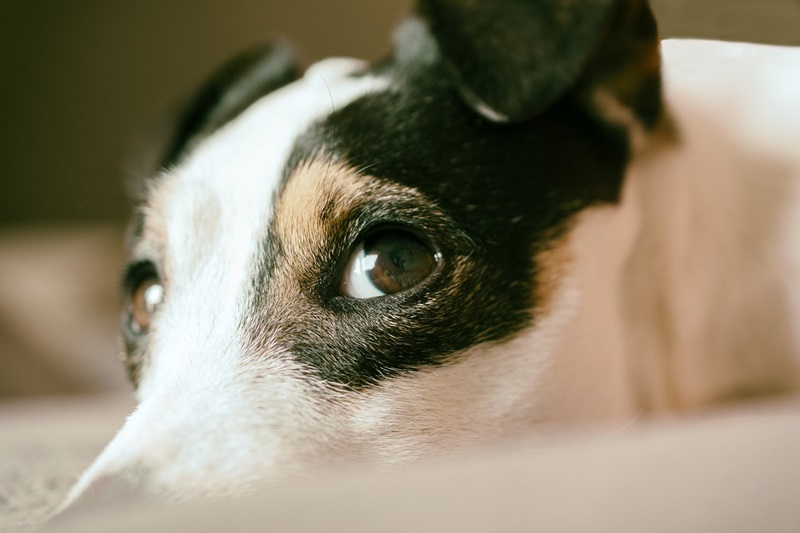
Loud or unexpected noises like fireworks or thunderstorms can be frightening for some dogs.
From flashes to booming sounds, the startling nature of fireworks trigger the “fight or flight” effect in dogs. This causes dogs to decide fireworks are a threat or potentially harmful, which can turn into fear and panic.
Reactions to fireworks
Fireworks are scary to dogs because they’re loud, unexpected noises. This is especially true if they haven’t been exposed to these sounds or have had a traumatic experience around fireworks. Sometimes they can learn to be scared of them from other dogs.
Research shows at least 40% of dogs have noise-related phobias. This definitely includes fireworks, which trigger a stress response that affects your dog’s overall health. Depending on how close you are, fireworks can also hurt your dog’s hearing as they ring in at 120 decibels.
However every dog reacts to fireworks differently. You can have one dog who sleeps through fireworks without a second thought and one who panics at the first “pop.”

Symptoms of fireworks phobia in dogs
The most common symptoms seen with firework phobias are shaking and trembling. Other possible symptoms include:
- Hiding or cowering
- Holding their ears flattened
- Wide pupils
- Barking, whining, howling
- Panting
- Drooling
- Broken teeth, cuts or ripped nails from trying to escape
- Defense aggression
- Urinating or defecating indoors
The good news is there are several ways you can help him through it. We’ve outlined below how to tell if fireworks are negatively impacting your dog, and what you can do about it.
What to do on days you expect fireworks
- Stay with your dog. He could panic if left alone. Having you or someone he knows and trusts for company will help him relax.
- Don't go out after dark. Make sure you're cozy inside and settled well before any fireworks start. Never force your dog outside during fireworks.
- Give your dog any prescribed medication before fireworks start.
- Check that your house and garden are escape-proof. Your dog may try to run away if he' scared.
Create a Safe Space
Create a place where your dog will hopefully feel comfortable and get him used to it beforehand. Dogs are den animals - they’re looking for that cave to get away from it all.
Try setting up an area in a quiet space away from windows so that he can’t hear or see fireworks. It might be in the basement or a larger closet. Use a crate if that’s where your dog feels safe, and make sure to provide him with familiar toys and treats.
A big part of why fireworks scare your dog are the sounds and bright lights. So closing the curtains and covering his crate will dampen the sound and the flashes of lights. It will help your dog feel safe and secure. Also be sure to include his bed, toys, and a familiar blanket.
If you know your dog is frightened by fireworks, you can set up a safe space weeks in advance. This will give him time to become accustomed to it. Encourage your dog to see this as a safe space by spraying pheromones, offering treats, or leaving one of your worn t-shirts.

Play White Noise or Music
You can try leaving a fan, TV, or sound machine on to help mask the sounds of the fireworks. By masking the sounds of those crashes and booms, you can quickly reduce his stress levels.
When choosing what type of sounds to play, consider classical music. In a recent study, playing classical music in animal shelters helped dogs spend more time sleeping or laying down and less time barking.
Keep the volume low enough that your dog can hear it, but it doesn't cause him stress. Watch for panting, pacing, leaving the area, or trying to hide. Dogs learn better when they're not stressed.
When your dog does well at a lower sound level, try increasing the volume gradually. You want to get him used to listening to sounds that are just loud enough to camouflage the sounds that frighten him. You can still hear the fireworks, but it's mixed in with other sounds so it's not as jarring.
Here are a few YouTube videos to check out:
Relaxing Music for Dogs to Calm Down | GREAT FOR FIREWORKS!
Dog's favorite music, Dog sleep music, Stress relief and Separation anxiety music, Stability music.
12 Hours Anti Anxiety Music for Dogs Stress Relief Music For Dogs ♬ Calming Music For Dogs
You may want to listen to a few to see if they might work for your dog. Especially check for ads that can be jarring, instead of soothing. If that happens, switch to a different video.
Tips:
Keep the volume at a level that masks fireworks, but isn’t too loud.
Start playing the sound a few hours before the fireworks begin to acclimate the dog.
Hang out with your dog to help him feel even more secure.
Fireworks Desensitizing Training
If your dog is sensitive to fireworks noise and it's still a few weeks away, you can try desensitizing training. Start by playing with your dog and then turn on the sounds of fireworks, but keep the sound low.
The goal is to get your dog to relax and not worry about the whizzes and bangs of the fireworks. You may need to repeat this several times. When your dog seems comfortable, try increasing the volume slightly.
Next is simulating the exact scenario your dog will face when the real fireworks start. Put him in his safe space and add some treats or toys. Try closing the curtains or wait until after dark. Turn the fireworks noise on low. Make gradual changes so you don't overwhelm him all at once.

Use a Lick Mat
Licking is a self-soothing act that helps your dog’s body release a happiness hormone to help him relax. To encourage licking you can pick up a lick mat and cover it with a tasty spread. Lick mats not only keep your dog entertained, they can reduce stress and anxiety plus slow down fast eaters.
When choosing a mat look for the correct size (not too big or too small), made from high-quality materials such as silicone, and dishwasher safe. I found mine online.
Here are a few ideas of what to spread on the pad:
- canned dog food
- mashed bananas
- canned pumpkin - not the pie filling
- peanut butter - check that it does not contain xylitol
- yogurt - low-fat, plain yogurt
- sardines packed in water
Be sure to count these calories so your dog doesn't put on unwanted weight.
If you have a fast eater, you can spread a tasty treat on the mat and freeze it before serving.
Don't forget to clean the mat after use. Rinse with warm water, then gently scrub using mild soap, and finish by rinsing well and letting it air dry.
Exercise Before the Fireworks Start
Dogs with pent-up energy tend to be more reactive than those who have been well exercised. Exercise also releases endorphins, which are “happy” hormones.
Double-check the fit of your dog’s collar or harness before going outside. A leash is an added safety measure to keep your dog close to you and under control in case they are startled.
Go for a run. Play fetch. Take a long walk. Have a play date with a canine pal.
Just make sure you exercise your dog and are inside again well before any fireworks could start.
Calming Products
If you dog shows signs of fear in response to fireworks or loud noises, talk with your vet to see what he recommends. Here are some products that might help:
- Medications: Sileo® helps dogs cope with anxiety during thunderstorms and fireworks.
- Pressure wrap or anxiety vest: These wrap your dog in a warm hug. The gentle pressure can help release calming hormones. In a pinch you can use an Ace bandage, criss-crossing it from his fore chest to shoulders and around his rib cage. Make it snug, but not tight.
- Pheromones: Dog-appeasing pheromone (DAP, or Adaptil®) mimics the pheromones produced by a mother dog, creating a sense of well-being in dogs. It’s available as a room diffuser, spray, or collar and can help your dog’s firework anxiety.
Plan for emergency situations
The Fourth of July represents the worst day for lost pets as dogs attempt to escape frightening sounds. And those panicked flights are dangerous. Many dogs won't stop running during firework displays until they are completely exhausted, injured, or killed.
If you're thinking about going somewhere else for the evening, you might want to reconsider. Whether to country or city, there's still likely to be fireworks nearby. What might happen if he gets away from you, especially if he's in an unfamiliar area. He would likely be safer at home, tucked away in a crate.
Just in case, make sure your dog is microchipped and his information is up to date. Second best is wearing a well-fitting collar with ID tags. Also have your veterinarian's contact information handy, plus contact information for anyone who can help search for your dog, if necessary.
Post-Event Recovery
And don’t forget that it can take 8-12 hours for the stress of the fireworks anxiety to dissipate. Plan to stay in for the remainder of the night. You never know when a stray “pop” may trigger that fear and send your dog back into a panic.
If your dog has to go out to potty, be sure to use a sturdy collar and leash.
---
The information provided in this website should not be used to diagnose or treat a health problem or disease; it is not intended to offer any legal opinion or advice or a substitute for professional safety advice or professional care. Please consult your veterinarian for professional advice. This content is for educational purposes only.


